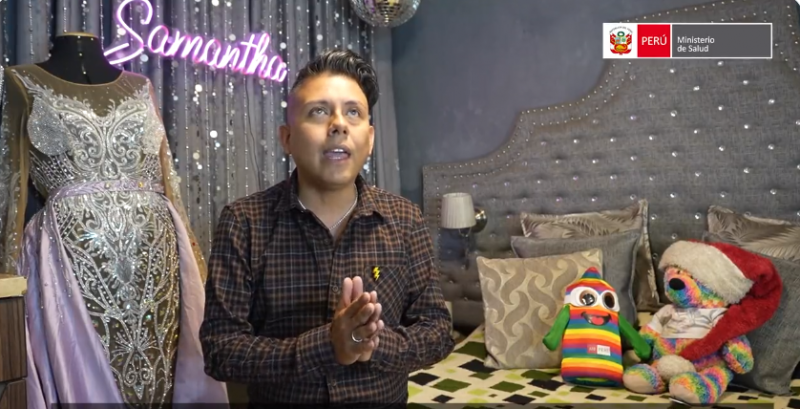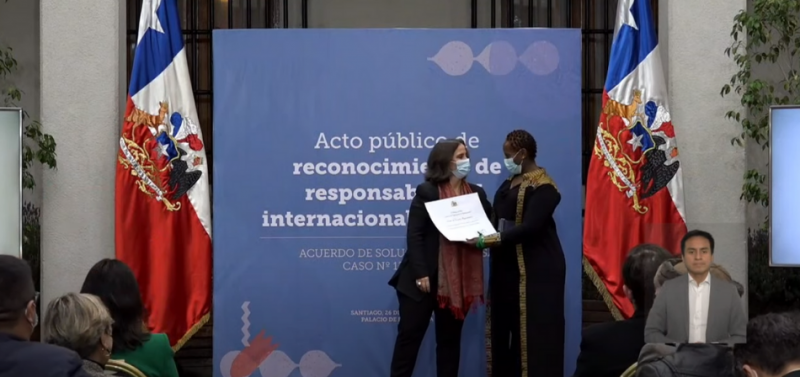GENEVA, 27 May 2022—UNAIDS welcomes the Chilean Government’s public acknowledgement of international responsibility in the emblematic case of violations of the rights of women living with HIV who were sterilized without their consent. The President of Chile, Gabriel Boric Font, has issued a public apology as part of a settlement resulting from a case brought before the Inter-American Commission on Human Rights against the Chilean state by Francisca, a Chilean woman living with HIV who was sterilized without her consent shortly after giving birth in 2002.
“We welcome the recognition of international accountability in this emblematic case of human rights violations that women living with HIV and their reproductive autonomy have long suffered,” said Luisa Cabal, Director of the UNAIDS Regional Support Team for Latin America and the Caribbean. “It vindicates a journey of more than 10 years, both for Francisca and the organizations that accompanied her, in her quest for justice.”
When Francisca—a young woman from a rural town in Chile—turned 20 years old, she and her partner received the happy news of the arrival of their first child. She was diagnosed with HIV in a routine prenatal test. Francisca took all appropriate measures to minimize the risk of vertical transmission of HIV and gave birth to an HIV-negative baby boy in November 2002. However, the day after the caesarean section, Francisca received the devastating news that the surgeon on duty had decided to sterilize her during delivery and without her consent.
In 2009, the Center for Reproductive Rights and the Chilean organization Vivo Positivo took Francisca’s case to the Inter-American Commission on Human Rights. This case was part of a documentation of stories of Chilean women living with HIV who were often pressured not to become pregnant, as well as to undergo surgical sterilization. One of the documented accounts tells of another woman, identified as Daniela, who, after giving birth, was told that she could not hug or kiss her newborn child because she would transmit HIV to her baby. She said in interviews that this was how she understood what discrimination was.
After more than a decade of international litigation and after the Inter-American Commission on Human Rights studied the case, a friendly settlement agreement was signed with the Chilean state, in which the government accepted its responsibility and committed to redress the violations and to take measures to ensure that such acts would not happen again.
UNAIDS intervened in this case with an amicus curiae (friend of the court) brief that informed the Inter-American Commission on Human Rights on the health guidelines and human rights standards that each country must follow to respect, protect and guarantee the human rights of people living with HIV.
“I would like to start by apologising to Francisca, who I understand is on the other side of the camera, for the serious violation of your rights and also for the denial of justice and for all the time you had to wait for this,” Mr Boric said at the opening of his speech during the official ceremony, broadcast live on social media. “How many people like you do we not know? It hurts to think that the state, which today I have the honour to represent, is responsible for these cases. I pledge to you, and to those who today represent you here in person, that while we govern, we will give the best of each one of us as authorities so that something like this will never happen again and certainly so that in cases where these atrocities have already been committed, they will be properly redressed.”
“I would love to have been me, with my voice, my face and my body, the one who after so many years of struggle stood present to lead this act in my own name. However, making my identity known would have closed endless doors for me,” said Carmen Martinez, the Associate Director of Legal Strategies for Latin America and the Caribbean for the Center for Reproductive Rights, as she read the words shared by Francisca to the audience. “To this day, people who carry HIV are still looked down upon with contempt as if it was our decision to become infected. However, I want to believe with conviction that this will change.”
“Finally, justice was done; through this case we call on all governments to continue to invest in the elimination of HIV discrimination in all services, including health care,” said Sara Araya, the Coordinator of Live Positive Gender. “The message is clear: the autonomy and physical integrity of women and all people living with HIV must be secured without discrimination. No more rights violations against women living with HIV.”
HIV-related stigma and discrimination has a significant impact on the health, lives and well-being of people living with or at risk of HIV. Stigma and discrimination hinders the HIV response by limiting access to broader sexual and reproductive health and other health services. UNAIDS continues to work daily to ensure that governments invest in preventing and responding to violations linked to the forms of intersectional discrimination to which people living with HIV have been subjected.
Francisca delivered a healthy baby boy in 2002 and was then sterilized without her consent by the doctor who carried out her caesarean section, making the decision that a woman living with HIV should not be able to have children. The friendly agreement announced this week comes after more than a decade’s litigation by the woman and her legal teams.
“This settlement is a significant moment for women around the world who have been fighting for reproductive justice for decades. Coercive sterilization of women living with HIV is a violation of women’s most fundamental human rights,” said the Executive Director of UNAIDS, Winnie Byanyima. “Unfortunately, this practice is still happening in many countries and efforts to stop it and bring justice to more women must be stepped up.”
This settlement comes after years of efforts before the Inter-American Commission on Human Rights after an earlier complaint in the Chilean justice system was unsuccessful. The case was litigated by the Chilean organization Vivo Positivo and the international human rights organization Center for Reproductive Rights.
The Global AIDS Strategy 2021–2026: End Inequalities, End AIDS is based on the promotion of human rights, gender equality and dignity, free from stigma and discrimination for all people living with and affected by HIV. It is a commitment by UNAIDS to an ambitious vision to end gender inequalities and realize human rights, including the right to health, calling on all partners and stakeholders in the HIV response in all countries to transform unequal gender norms and end stigma and discrimination.
UNAIDS
The Joint United Nations Programme on HIV/AIDS (UNAIDS) leads and inspires the world to achieve its shared vision of zero new HIV infections, zero discrimination and zero AIDS-related deaths. UNAIDS unites the efforts of 11 UN organizations—UNHCR, UNICEF, WFP, UNDP, UNFPA, UNODC, UN Women, ILO, UNESCO, WHO and the World Bank—and works closely with global and national partners towards ending the AIDS epidemic by 2030 as part of the Sustainable Development Goals. Learn more at unaids.org and connect with us on Facebook, Twitter, Instagram and YouTube.





